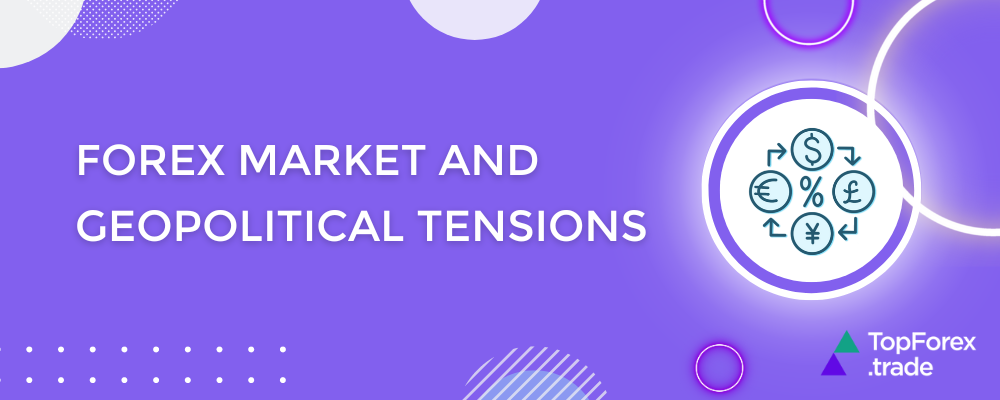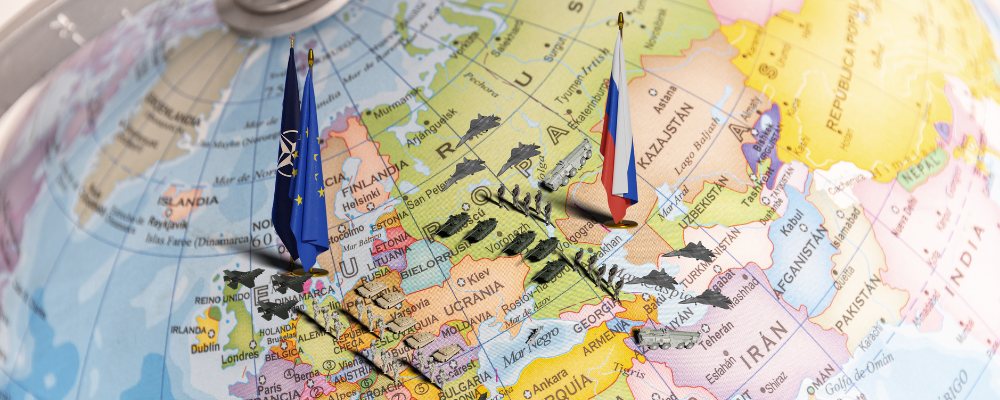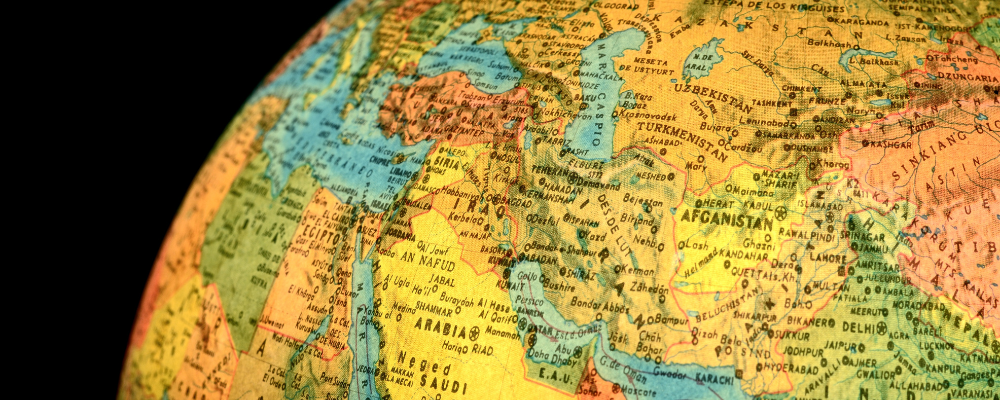Impact of geopolitical tensions on Forex markets

In today’s interconnected world, currency markets are susceptible to geopolitical events. Trade wars, political instability, military conflicts, and diplomatic disputes can cause sudden shifts in currency values, impacting global trade and economic stability.
This article explores how geopolitical tensions influence currency markets. We examine how political developments affect investor behavior and market dynamics through historical examples and current events. We also look at the strategies central banks, governments, and investors use to manage these uncertainties.
Forex market and geopolitical tensions

Geopolitical tensions can cause notable fluctuations in Forex markets, leading to increased volatility and shifts in currency values. This article explores historical and current events to illustrate these effects, along with strategies employed by central banks, governments, and investors to manage uncertainties.
Historical examples:
Brexit (2016-present):
- Impact: The British pound (GBP) fell sharply in the wake of the Brexit referendum. On June 24, 2016, the day after the vote, the GBP/USD exchange rate plummeted from about 1.50 to 1.32, a drop of nearly 12%. This decline was driven by uncertainty over the UK’s future relationship with the EU.
- Response: The Bank of England responded by cutting interest rates from 0.50% to 0.25% in August 2016 and initiated a £435 billion quantitative easing program to stabilize the currency and economy.
Russian annexation of Crimea (2014):
- Impact: The Russian ruble (RUB) experienced a significant decline following the annexation of Crimea and the subsequent imposition of Western sanctions. In late 2014, the RUB/USD exchange rate dropped from around 35 RUB/USD in January to nearly 70 RUB/USD by December, reflecting a loss of over 50% in value.
- Response: The Central Bank of Russia raised its key interest rate from 5.5% to 17% in December 2014 to support the ruble and curb inflation.
Gulf War (1990-1991):
- Impact: During the Gulf War, the US dollar (USD) strengthened as investors sought safe-haven assets amid geopolitical uncertainty. The USD/JPY exchange rate increased from about 145 JPY/USD in early August 1990 to around 129 JPY/USD by the end of the year, reflecting a stronger USD.
- Response: The Federal Reserve maintained a steady policy, focusing on broader economic stability rather than direct intervention in Forex markets.
Current events:
US-China Trade War (2018-Present):
- Impact: The Chinese yuan (CNY) depreciated significantly due to the trade war. For instance, in August 2019, the CNY/USD exchange rate fell to about 7.10 CNY/USD, compared to around 6.40 CNY/USD at the start of the trade tensions in early 2018. This 10% drop was driven by tariffs and trade barriers.
- Response: The People’s Bank of China adjusted monetary policy and engaged in controlled currency devaluation to mitigate economic impacts and stabilize the yuan.
Russia-Ukraine Conflict (2022-present):
- Impact: The Russian ruble (RUB) initially fell sharply in early 2022 due to the conflict and international sanctions. The RUB/USD exchange rate rose from about 74 RUB/USD in January to over 150 RUB/USD in March. However, it later recovered somewhat as the Russian government imposed capital controls and increased interest rates.
- Response: The Central Bank of Russia implemented measures including raising the key interest rate to 20% and imposing capital controls to stabilize the ruble.
Strategies to manage uncertainties in the FX market

Central banks:
- Interest rate adjustments: Central banks often alter interest rates to influence currency value. For example, the Bank of England’s interest rate cut post-Brexit aimed to support the GBP, while the Central Bank of Russia’s rate hike was intended to stabilize the RUB.
- Market intervention: Direct market intervention, such as currency purchases or sales, helps stabilize exchange rates. The Federal Reserve’s steady policy during the Gulf War indirectly supported a stronger USD.
Governments:
- Diplomatic efforts: Governments engage in diplomatic negotiations to resolve conflicts and stabilize markets. Successful resolutions can mitigate currency volatility.
- Economic sanctions: Sanctions affect trade flows and investor confidence, influencing currency values. The impact of sanctions on Russia’s ruble demonstrates this dynamic.
Traders and investors:
- Diversification: Investors spread risk across different assets and currencies to manage exposure. During periods of geopolitical uncertainty, diversifying into stable assets can help mitigate losses.
- Safe-haven assets: Investing in safe-haven currencies like the Swiss franc (CHF) or assets like gold can provide protection during geopolitical crises. For instance, during the Brexit vote, the CHF appreciated as investors sought stability.
In summary, geopolitical tensions lead to significant movements in Forex markets, with currencies rising or falling based on investor sentiment, policy responses, and economic conditions. Historical and current examples illustrate how central banks, governments, and investors navigate these uncertainties through various strategies.
Tips for Forex traders navigating geopolitical tensions

Geopolitical tensions can introduce significant volatility and unpredictability in Forex markets. To navigate these challenges effectively, Forex traders should consider the following tips:
1. Stay informed on global events
- Monitor news: Keep up with the latest geopolitical developments through reliable news sources. Events such as trade disputes, elections, and military conflicts can affect currency values.
- Economic calendars: Follow economic calendars and schedules for major geopolitical events and central bank meetings, which can impact market sentiment and currency movements.
2. Understand market reactions
- Historical context: Study how past geopolitical events have affected currency markets. For example, analyze how the GBP reacted to Brexit or how the RUB was impacted by sanctions.
- Current impact: Evaluate how ongoing geopolitical issues, like the US-China trade war or the Russia-Ukraine conflict, influence currency pairs you are trading.
3. Implement risk management strategies
- Set stop-loss orders: Use stop-loss orders to limit potential losses if the market moves against your position.
- Diversify your portfolio: Spread your investments across different currency pairs and asset classes to reduce risk exposure.
- Position sizing: Adjust the size of your trades based on your risk tolerance and market conditions to manage exposure effectively.
4. Adapt your trading strategy
- Stay flexible: Be prepared to adjust your trading strategy in response to new information or changing market conditions. Geopolitical events can lead to rapid and unpredictable market movements.
- Technical and fundamental analysis: Combine technical analysis with fundamental analysis to gain a comprehensive view of market conditions. Use technical indicators to identify entry and exit points while considering fundamental factors driving currency movements.
5. Use safe-haven assets wisely
- Safe-haven currencies: Consider trading safe-haven currencies like the Swiss franc (CHF) or Japanese yen (JPY) during periods of heightened geopolitical uncertainty.
- Precious metals: Invest in gold or other precious metals, which often act as safe-haven assets during market turmoil.
6. Monitor central bank policies
- Interest rates: Keep track of interest rate decisions and monetary policy statements from central banks, as these can significantly influence currency values.
- Market interventions: Be aware of any direct market interventions by central banks, such as currency purchases or sales, which can impact Forex markets.
7. Leverage advanced tools and technology
- Trading platforms: Utilize advanced trading platforms that offer real-time news feeds, technical analysis tools, and automated trading features to stay ahead of market movements.
- Alerts and notifications: Set up alerts for significant news events and price changes to react promptly to market developments.
By staying informed, managing risk, and adapting strategies to the dynamic Forex market, traders can navigate the challenges posed by geopolitical tensions and make more informed trading decisions.
Top Forex brokers for handling geopolitical tensions
Geopolitical tensions can create a lot of uncertainty in the Forex market, making it crucial to have a reliable broker by your side. This list showcases the best Forex brokers that can help you navigate these turbulent times with ease. From powerful trading tools to strong support, these brokers are well-equipped to handle market volatility and keep your trading on track.
XTB FX trading
XTB stands out as a top choice for Forex and CFD trading, boasting a strong global presence in over 190 countries. Known for its commitment to financial security and transparency, XTB is regulated by respected authorities like the FCA, CySEC, and KNF.
With more than 1,500 CFDs across forex pairs, indices, commodities, shares, and cryptocurrencies, XTB offers diverse trading opportunities. Traders can use user-friendly platforms like xStation and MetaTrader 4, which come with advanced tools to support informed decision-making.
XTB caters to different trading styles with various account types, including Standard and swap-free options, each featuring tailored fees and benefits. The broker also provides a range of research and analysis resources, including daily market insights, economic calendars, and webinars, to help traders stay ahead of market trends and major events.
Exness FX trading
Exness is a well-regarded Forex broker known for its wide range of trading options, including currency pairs, commodities, indices, and cryptocurrencies.
The broker emphasizes regulatory adherence, operating under the oversight of reputable authorities such as the FCA in the UK and CySEC in Cyprus to ensure a secure trading environment.
Exness features competitive spreads that vary with the account type, offering both Standard and Professional accounts with different benefits and conditions.
Customer support is readily available via email, live chat, and phone. Traders can use popular platforms like MetaTrader 4 (MT4) and MetaTrader 5 (MT5), both renowned for their user-friendly design and advanced charting tools, providing a smooth trading experience.
eToro FX trading
eToro is a top Social trading and investment platform that has transformed finance with its easy-to-use interface and focus on community interaction. It offers a diverse range of financial instruments, including currency pairs, stocks, cryptocurrencies, commodities, and indices, making trading accessible and enjoyable for all.
One of eToro’s standout features is its Social Trading, which connects users with a global network of traders. Its mobile app, available on iOS and Android, provides a smooth trading experience with an intuitive design, allowing you to trade on the go.
eToro keeps users informed with real-time market data, live quotes, and charts, and provides advanced trading tools like technical indicators and drawing tools for in-depth analysis. The platform also includes portfolio management features and the CopyTrader function, letting users mimic the trades of successful investors. This makes eToro a great choice for both newcomers and those who prefer a more hands-off approach.
Risk disclaimer: eToro is a multi-asset platform which offers both investing in stocks and cryptoassets, as well as trading CFDs.
CFDs are complex instruments and come with a high risk of losing money rapidly due to leverage. 61% of retail investor accounts lose money when trading CFDs with this provider. You should consider whether you understand how CFDs work, and whether you can afford to take the high risk of losing your money.
This communication is intended for information and educational purposes only and should not be considered investment advice or investment recommendation. Past performance is not an indication of future results.
Copy Trading does not amount to investment advice. The value of your investments may go up or down. Your capital is at risk.
Don’t invest unless you’re prepared to lose all the money you invest. This is a high-risk investment and you should not expect to be protected if something goes wrong. Take 2 mins to learn more.
eToro USA LLC does not offer CFDs and makes no representation and assumes no liability as to the accuracy or completeness of the content of this publication, which has been prepared by our partner utilizing publicly available non-entity specific information about eToro.
HF Markets FX trading
HF Markets is a top choice for traders looking for a broad range of asset trading options. With access to over 1,200 financial instruments, including currency pairs, energies, indices, commodities, ETFs, stocks, and bonds, HF Markets caters to diverse trading needs.
The broker offers several trading platforms, including MT4 and MT5, available on desktop, web, and mobile devices. Their trading app provides added convenience, and a VPS service boosts performance for traders.
HF Markets offers various account types, such as Premium, Pro, Zero, and Cent, each with different minimum deposits, leverage, and spreads. Beginners can use a demo account to practice strategies and explore different instruments before committing real funds.
XM Group FX trading
XM Group, established in 2009 and headquartered in Belize, is a respected online broker for Forex and CFD trading. It is regulated by major financial authorities, including the Cyprus Securities and Exchange Commission (CySEC) and the Financial Conduct Authority (FCA) in the UK. This robust regulatory oversight ensures a high level of trust and safety for its users.
One notable feature of XM Group is its commitment to security, including the provision of 2-step authentication for enhanced account protection. This added layer of security helps safeguard traders’ accounts from unauthorized access.
In terms of trading options, XM Group offers a diverse range of instruments, including currency pairs, stocks, commodities, and indices. This variety allows traders to explore multiple markets and diversify their portfolios effectively. The platform is well-regarded for its user-friendly interfaces and comprehensive trading tools, catering to both novice and experienced traders.
XM Group also stands out for its competitive spreads and a variety of account types designed to meet different trading needs. Whether you are a beginner using a demo account to practice or an advanced trader seeking specialized features, XM Group provides the necessary tools and resources for a successful trading experience.
Related articles:
- How to start Forex trading and enter the exchange: 10 steps to your first deal with an online broker
Impact of geopolitical tensions on Forex markets - FAQ